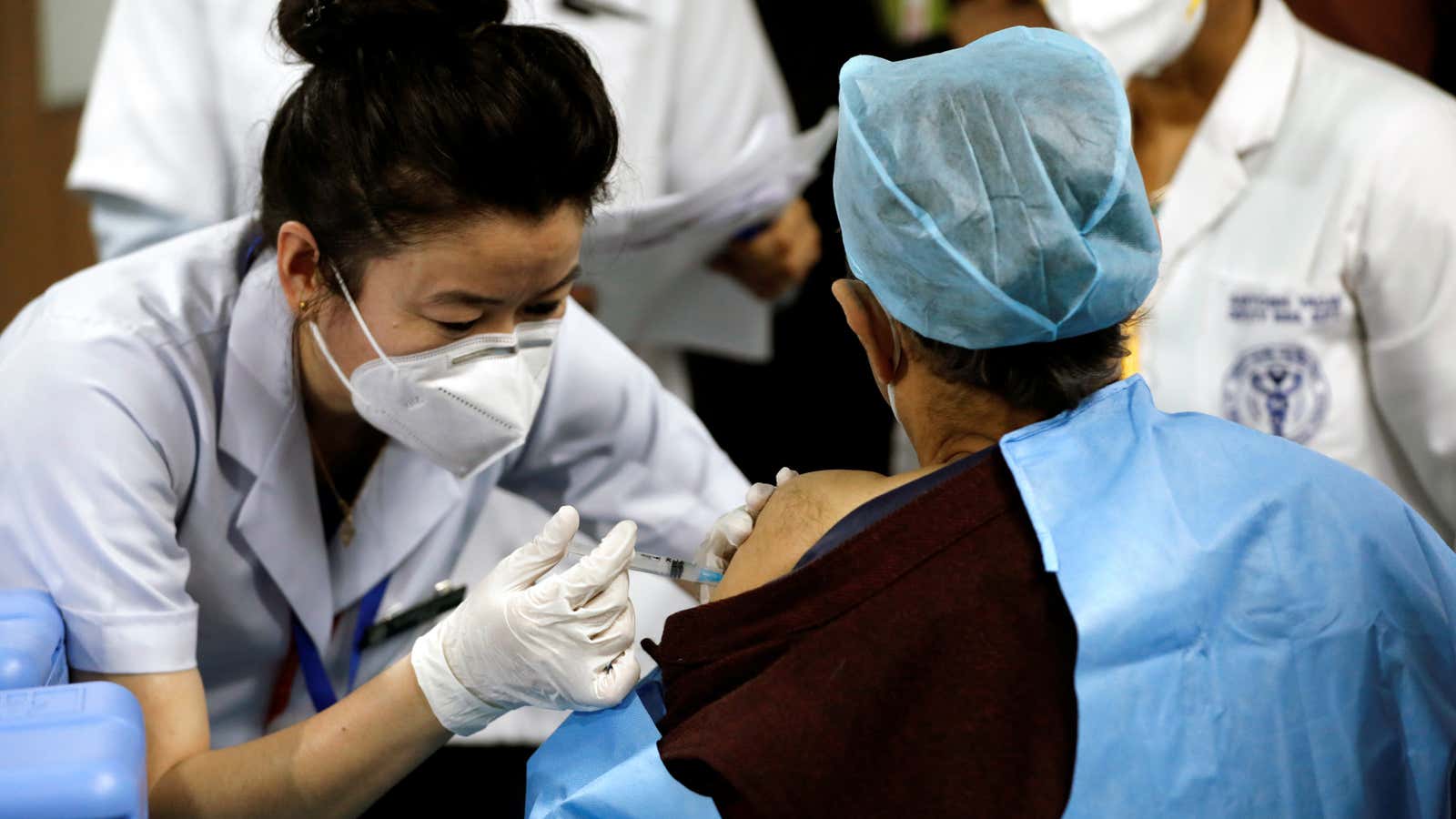A new change in regulation has resurfaced old wounds about vaccine prices in India.
At Rs1,200 ($16.42) a dose, Bharat Biotech’s Covaxin, a Covid-19 vaccine fully developed and manufactured in India, is the most pricey option available at private hospitals in India. The vaccine is not only more expensive than the other locally manufactured option, Covishield, but costs more than even the imported Sputnik V.
Covaxin’s pricing is “nothing but governmental sanction for Bharat Biotech to make super profits,” says Malini Aisola, co-convener of the All India Drug Action Network (AIDAN), an independent collective of healthcare professionals and nonprofits. “These unethically inflated prices have no correlation to its cost of production,” she says.
The price of Covaxin sticks out like a sore thumb especially given the fact that industry experts estimate it costs around Rs40 to produce one dose of the vaccine. Bharat Biotech did not reply to Quartz’s email about the rationale behind its pricing strategy.
To be clear, all these vaccines are being offered free of cost at government-run hospitals and health centres, and these prices are applicable only to those who opt to pay and get vaccinated at private hospitals.
The rationale behind Covaxin’s price
These prices were announced by vaccine makers in April when the Indian government allowed companies to directly sell to states and private hospitals. Vaccine makers can reserve 25% of their stock for private vaccination centres under this policy. But even in this limited scope, Bharat Biotech’s prices seem unjustified.
For one, Covaxin is a homegrown vaccine, developed jointly with the Indian Council for Medical Research (ICMR), the government’s medical research arm. In fact, the ICMR is entitled to a 5% royalty on Covaxin sales. Such a vaccine should have ideally offered an economic benefit to the Indian government and its citizens, especially since it cuts down the effort of negotiating in an international market.
This made-in-India “aatmanirbhar” (self-reliant) sentiment was highlighted by Bharat Biotech’s founder Krishna Ella in August 2020. At a conference on Aug 4, 2020, Ella had pointed to a bottle of water in front of him and said that it costs “five times more than our vaccine.” (Bottled water in India costs upwards of Rs20.)
Prices being determined directly by the vaccine maker is also the central government’s failure. “The situation is made worse by the fact that the government is a partner in this vaccine and has not stepped in to fix this. In fact, the ICMR draws royalties on vaccine sales. Where is commitment towards affordable access?”
In April, Bharat Biotech had also initially announced a price of Rs600 per dose for Indian states but brought it down to Rs400 a few days later. By contrast, it has thus far sold the vaccine for Rs150 a dose to the central government. Now that the central government has rolled back its decentralised vaccine procurement strategy—and the prices to the states are no longer applicable—it is likely that Bharat Biotech would renegotiate these prices.
Covaxin’s efficacy data
These prices are particularly surprising given that the phase 3 data for Covaxin have still not been published in a peer-reviewed scientific journal. Raches Ella, a project lead at the company, tweeted that the last volunteer for Covaxin’s phase 3 trial was vaccinated in mid-March, and it takes time to sift through data and to publish results in a peer-reviewed publication.
Covaxin was granted emergency use approval in January. ““Whereas the company says it will not be ready to share phase 3 results even in a preprint before July, it already presented the interim safety and efficacy data of 127 cases to the CDSCO’s subject expert committee in April,” Aisola says. “It has put out efficacy estimates based on interim analyses in press releases without providing any details. The factsheet has also been updated with the same estimate of efficacy. What is stopping Bharat Biotech from publishing the interim data or sharing the details with the public when it is not shying away from making these claims?”
